Internet of Things: Current and Future Profitability of Advanced Technologies
| ✅ Paper Type: Free Essay | ✅ Subject: Engineering |
| ✅ Wordcount: 3750 words | ✅ Published: 23 Sep 2019 |
IoT: Business, Finance and Management
LIST OF TABLES………………………………………………..Ⅴ
LIST OF FIGURES……………………………………………….Ⅵ
LIST OF SYMBOLS AND ABBREVIATIONS……………………………..ⅥⅠ
ACKNOWLEDGEMENTS…………………………………………ⅥⅡ
EXECUTIVE SUMMARY…………………………………………..Ⅸ
1 INTRODUCTION……………………………………………..1
1.1 IoT used in Business, Finance & Management………………………….1
2 OVERVIEW…………………………………………………3
2.1 BUSINESS IN IoT…………………………………………..3
2.1.1 business model generation…………………………………….3
2.1.2 business start up………………………………………….4
2.2 IoT OF SUPPLY CHAIN FINANCING………………………………5
2.2.1 The Meaning of Supply Chain Financing……………………………5
2.2.2 The Characteristics of Supply Chain Financing………………………..7
2.3 IoT IN MANAGEMENT………………………………………7
2.3.1 Data management…………………………………………7
2.3.2 Hotel management…………………………………………9
2.3.3 Event management………………………………………..10
2.3.4 Production management……………………………………..10
3 DESIGN METHODOLOGY………………………………………12
3.1 Business Model……………………………………………12
3.1.1 Framework of Business Models…………………………………..12
3.1.2 Process Design for Business Models………………………………..12
3.2 Finance Model……………………………………………13
3.2.1 data collection…………………………………………..13
3.2.2 sampling……………………………………………..13
3.2.3 measurement tool…………………………………………14
3.2.4 Implementation period……………………………………..14
3.2.5 data analysis software………………………………………14
3.2.6 data processing………………………………………….14
3.2.7 data analysis……………………………………………14
3.3 Management Model…………………………………………15
3.3.1 task and flow……………………………………………15
3.3.2 static and dynamic………………………………………..15
4 STRUCTURE ANALYSIS……………………………………….16
4.1 Business Analysis structure…………………………………….16
4.2 Finance Analysis structure……………………………………..17
4.3 Data Management structure…………………………………….18
5 CONCLUSIONS……………………………………………..19
5.1 IoT In Business……………………………………………19
5.2 IoT In Finance…………………………………………….19
5.3 IoT In Management…………………………………………20
REFERENCES………………………………………………….21
LIST OF TABLES
Table 1 Belt list with operational data………………………….8
Figure 1 Framwork for IT business model design ……………………………..4
Figure 2 Business start up……………………………………………………….4
Figure 3 Financial services of the supply chain……………………………………………6
Figure 4 Real estate loan service ……………………………………………….6
Figure 5 Hotel management …………………………………………………….9
Figure 6 Event management…………………………………………..………..10
Figure 7 Functions of production management……………………………….11
Figure 8 Business model design process……………………………………….12
Figure 9 Business analysis structure……………………………………………16
Figure 10 Finance analysis structure……………………………………………17
Figure 11 Data management structure…………………………………………18
LIST OF SYMBOLS AND ABBREVIATIONS
IOT Internet Of Things
BMG Business Model Generation
BMC Business Model Canvas
SaaS Software as a Service
MVP Minimum Visible Production
EDM Enterprise Data Management
EIS Enterprise Information System
PAPI Paper and Pencil Interview
CATI Computer Aided Telephone Interviewing
SME Small and Medium Enterprise
With the development of the Internet of Things, it has become one of the most important areas of future growth potential. From smart home watches, there are Internet of Things. This paper presents an analysis and assessment of the current and future profitability of advanced technologies, as well as the benefits of programmable IoT devices in this area and how it will play an important role for future generations. This paper proposes an IOT-based social device network based on cloud computing model, which provides a virtual execution environment due to its dispersibility, high reliability and accessibility anytime and anywhere. [2]
1 INTRODUCTion
1.1 IoT used in Business, Finance & Management
The internet of things (IoT) consistently venture into homes, business, social settings, saving money divisions, administrations and other ecological as an ever-increasing number of gadgets are associated for sharing and assembling data or information. There are different advantages of IoT from a client viewpoint. Shrewd items can prompt increment vitality proficiency, enhancement of wellbeing, and nature of item, aside from the comfort angle.
The internet of things (IoT) entered in business. Digitalization is impedance in assembling industry which changing the elements of rivalry. The industrialization buys the web of things to build up a colossal reasonable upper hand. Organizations or ventures need to act now or hazard future development [5]. Techniques to meet an organization needs are creating as digitalization. Subjective processing, Software as a service (SaaS), Security, Blockchain and advanced twin are currently on exchanging top 5 IoT business thoughts. Security is a standout amongst the best IoT business thought. Security has turned out to be critical to an ever-increasing number of individuals and as IoT innovation interfaces each gadget in our lives. The globe has been associating with exceptional IP addresses for a more then over 10 years. The commoditization of sensors, processors, and memory are simply associated with regular things.
The internet of things (IoT) is the following enormous and moving toward things in money related administrations. Budgetary administrations have a colossal dealt in the PC party hazard and online bill installments now it is truly used to be unmistakable due to IoT. Innovation and application that give data about well-things probably won’t appear to be specifically significant to the way monetary administrations. A standout amongst the most critical preferred standpoint of IoT in saving money segment is giving simple to-get to administrations to Mastercard’s just as charge cards holder. Alongside ATMs, banks can likewise utilize IoT information in expediting request benefits nearer to client by giving booth and increment the openness of administrations to clients. The internet of things likewise helps clients in horticulture and cultivating segment, for instance, banks can investigate the yield and different states of homestead cops in like manner gauge the estimation of the yield and dependent on yield, banks can give adaptability in monetary term.
In the internet of things, innovation is performing in the correspondence and asset the executives, where the unnatural system is actualized. Advancements are additionally executed on IoT gadget the executives, where the way toward validating, provisioning designing are observing and keeping up the gadget firmware and programming, that give its practical capacities. Be that as it may, it is basic to building up and keeping up the wellbeing, network and security of IoT gadgets. One potential vision for the future clients may be a great deal engaging contribution of buyers in IoT gadgets whose recognize, and firmware are overseen utilizing an institutionalized procedure and freely from the application layer administrations.
2 OVERVIEW
2.1 BUSINESS IN Iot
In today’s rapidly changing business environment, it is difficult to design a business model in the process of developing a waterfall. We believe that the design of business models requires a new value-based approach that includes the designation of value-added IT that can be generated through continuous assessment and time-based training. objective. In this paper, we propose a lean design approach that uses the business model as a value-creating business model design method, using calculations based on this approach. We apply the proposed method to the design of the Internet of Things (IoT) business model [10] and evaluate its effectiveness.
2.1.1 Business model generation (BMG)
BMG is proposed to be developed as a business model methodology [11]. Business Model Canvas (BMC) is one of BMG technologies. The BMC consists of nine blocks covering four areas: customers, value propositions, infrastructure and funds. However, in BMC, it is difficult to achieve visualization and analysis in a specific way. In addition, business model design methods allow for repeated design of business model assumptions, enabling companies to create new value through IT. You can analyze the business value created by the IT department and design a business model that will repeat this value.

This figure is a design of business to system contribution. System architecture need some of requirements for enable fulfilled utilities to business architecture.
2.1.2 Business start up
Start-up is a way to conduct business in several stages. It repeats a construction and verification cycle in a short time [11]. He suggested creating a Minimum viable Product (MVP) to validate through the feedback loop of Building, Measurement, and Learning and repeat the improvements. However, it does not provide a design approach to the business model.
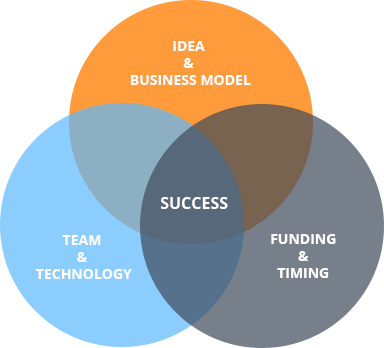
As per above model start up need three basics for success.
- Idea & Business model.
- Team & Technology.
- Funding & Timing.
2.2 SUPPLY CHAIN FINANCING WITH IoT
2.2.1 The meaning of supply chain financing
Supply chain finance is a more complex model financing, involving the cooperation of many companies and coordinate with each other. It consists of finance agency, third-party logistics company, leading business of medium and small enterprises supply chain finance. Moreover, it is a favorable external factor great convenience for the business environment enterprise development and cooperation. for Business development has brought a lot of cooperation Convenience. It plays a very important role in finance Supply chain services. The financing of the production network is providing more and more capital-related management for a company or various upstream companies, downstream production network companies, which are actively and easily promoting their work. It produces manageable advances in mechanical biology and positive ties that combine banks, organizations and shared product store networks to coordinate monetary capital and mechanical economy.
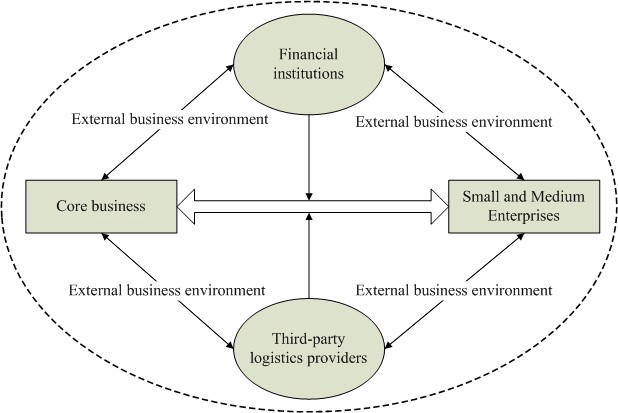
The given diagram shows financial services of the supply chain. In this figure financial institutions, small and medium enterprises, third-party logistics providers, and core businesses are connected via external business environment. It shows the real meaning of supply chain where every small enterprise is helped with other one.
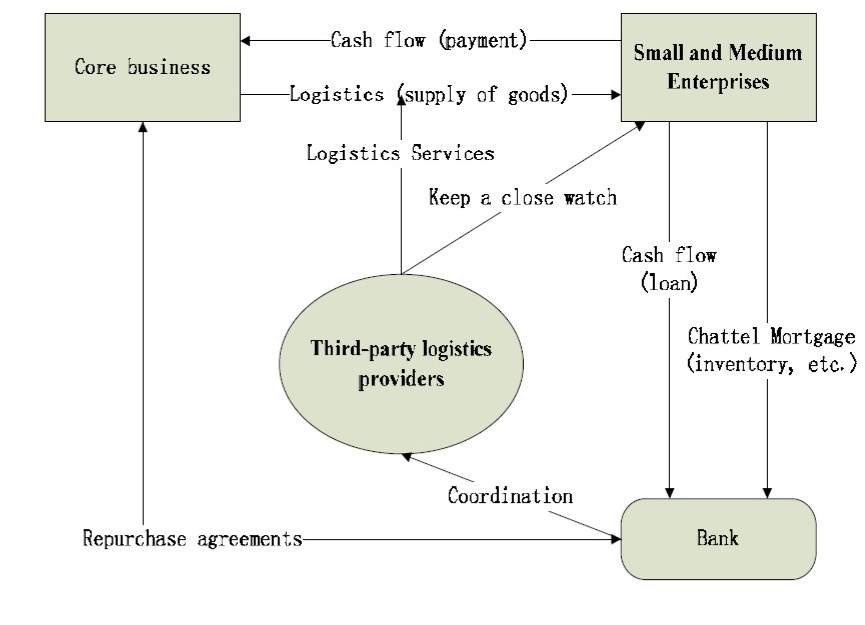
This diagram shows how real estate load process to businesses and enterprises from bank.
2.2.2 The characteristics of supply chain financing
- Leadership
- Outside-in process
- Mature horizontal processes
- The perfect organization
- Design
- Aligned metrics
- strong planning capabilities
These seven characteristics are commonly used in supply chain of financing where IoT help to improve a chain in various types of stages such as banking, transferring, data storing and easy to find any of information. In every characteristic of above IoT perform important part.
2.3 IoT in management
2.3.1 Data management
Enterprise Data Management (EDM) and Enterprise Information system (EIS) [3] is an old problem in the era of computer technology in companies around the world. The increasing complexity of concepts, technologies and software systems proves that Lehman’s second law is still valid in principle [3]. the company Still struggling, it is often impossible to implement a system that adds value to the business. With Industry 4.0, which is part of the German Federal Ministry of Education and Research’s high-tech strategy, a paradigm shift is taking place: in the “smart factory”, new levels of automation can be achieved, such as the Internet of Things (IoT) [12]. This goes beyond the idea of having a central technology system that centralizes all business data for later processing and visualization. Design principles such as interoperability, information transparency, technical assistance and decentralized decision making highlight all aspects of Industry 4.0.
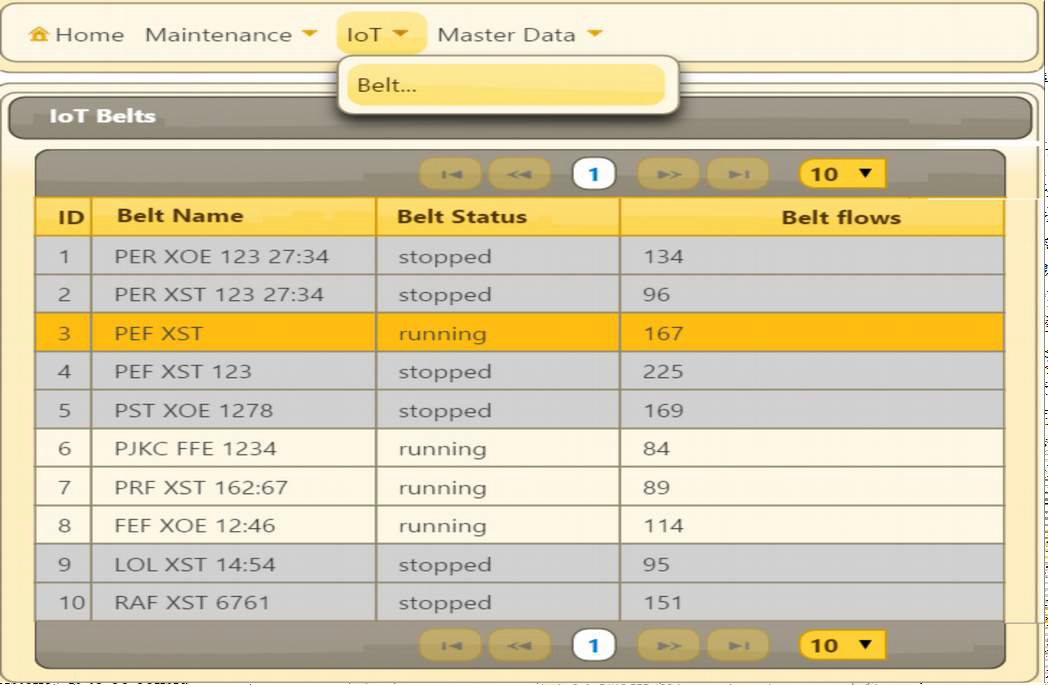
This table indicate how data assigned with help of IoT belt. It shows belt name, status, and flow of data. The operational belt data from the IoT devices must be combined with other data from relational data bases. This is one example why it is necessary to introduce an Enterprise Data Management (EDM) based on a Cloud Storage Hub.
2.3.2 Hotel management
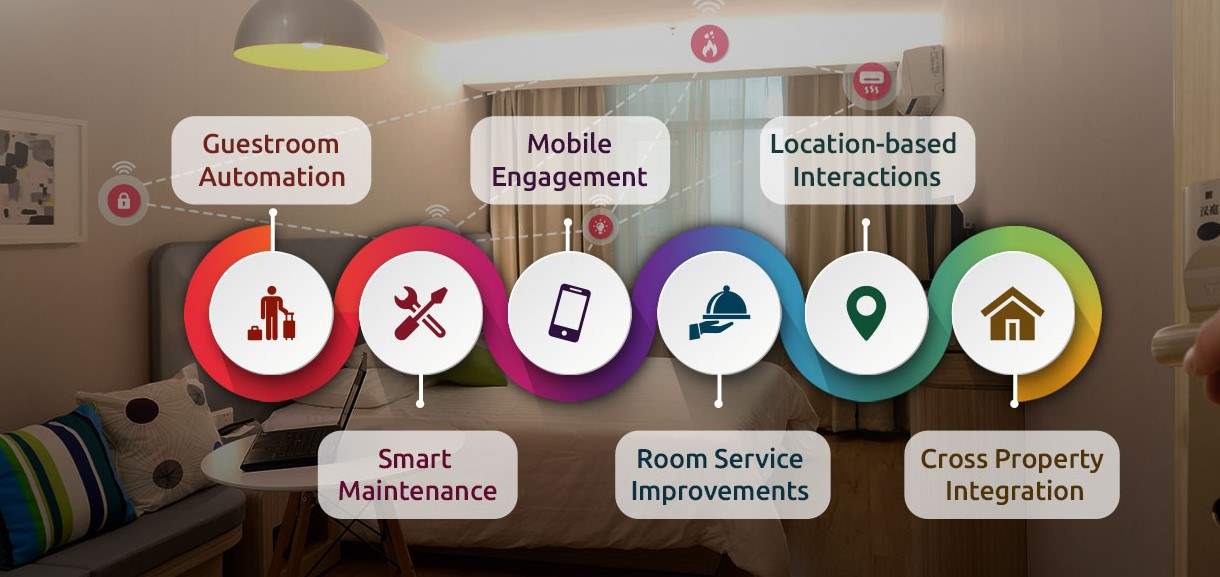
The Internet of Things (IoT) is never again a trendy expression. Presently, this reality gives significant energy to a wide range of organizations. The lodging business is no special case. The inn business’ Internet of Things has expanded the “knowledge” expected to furnish clients with better esteem and enhanced business activities execution. When associated gadgets convey and share data, lodgings and eateries can profit by the positive effect of the Internet of Things on the friendliness business, which are
- Personalized experience each time
- Energy efficient systems
- Reduced costs
- Mobile/ tablet/ app-based control
- Guestroom Automation
- Smart Maintenance
2.3.3 Event management
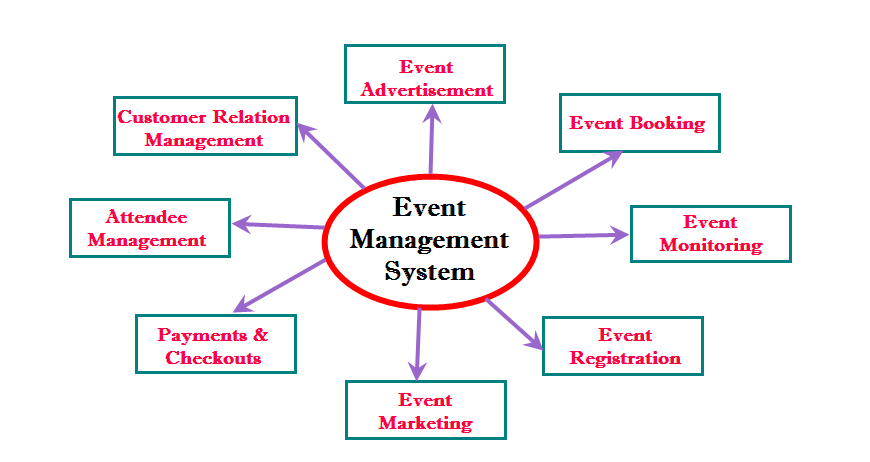
As shown in diagram of event management IoT plays an important role in each and every function displayed in diagram. Advertisement and marketing are well done on social medias. Online registrations are beginning in every event as well everyone can pay for registration online via debit or credit cards. Now in every events and offices finger attendance is exits.
2.3.4 production management
Today, an ever-increasing number of organizations are taking off Internet of Things (IoT) item designs, and these organizations are in urgent need of gifted experts who can deal with the complexities of the Internet of Things. These experts incorporate architects, information researchers, originators, and obviously IoT item supervisors. Be that as it may, the Internet of Things industry is still youthful, and organizations and item administrators are as yet attempting to comprehend the aptitudes required in this new innovation time.
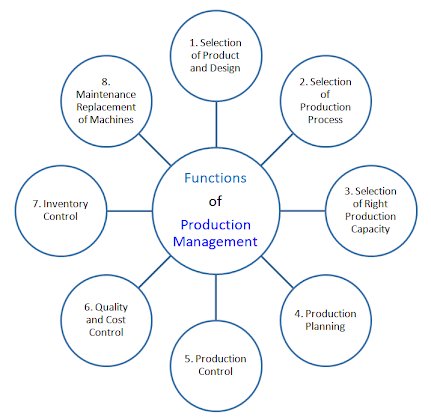
There are 8 basic function of production management where IoT used.
- selection of product and design
- selection of production process
- selection of production capacity
- production planning
- production control
- quality and cost control
- inventory control
- maintenance replacement of machines
3 DESIGN METHODOLOGY
3.1 BUSINESS mODEL
3.1.1 Framework of business model
The business model presented in this article is designed to use IT to create new value and achieve company-defined business goals. Based on the principle of separation of concerns, we classify the business model concerns into business architecture and system architecture, as shown in Figure 1. This makes it possible to fully understand the requirements.
3.1.2 Process design for business model
In order to design a business model in a rapidly changing business environment, it is difficult to predict business models and their expected value due to many uncertainties. Repeated trials and errors are inevitable. Regarding the design of business models, we take a way to extend the lightweight concept of repetitive testing.
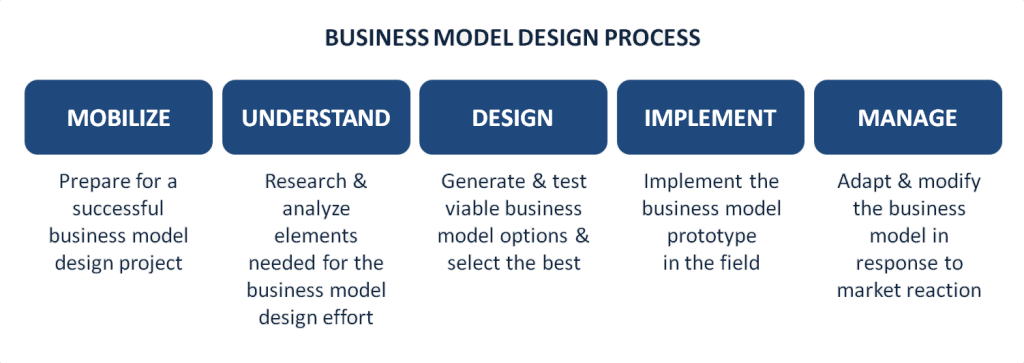
It is easier to understand with help of above process that how to design business process with help of 5 major functions, which are Mobilize, Understand, Design, Implement, and Manage.
3.2 FINANCE mODEL
3.2.1 Data collection
In the first month of the survey, data was collected through quantitative field studies using PAPI (paper and pencil interview), where face-to-face Ipsos trained investigators are working in banks and insurance companies. People ask questions. Write down their answers. Then use the logic check of the input and required filters to enter data via the RM + licensed software on the Ipsos server. The data is stored in the Ipsos MySQL base and exported to SPSS and Excel based data for further analysis of the data. In the remaining 35 months of the survey, data were collected through quantitative telephone research by applying the CATI method (computer aided telephone interviewing)
3.2.2 Sampling
The sampling frame is a list of banks and insurance companies in the National Bank of Serbia database. During the observation period, select respondents, which are chief economist, department head or department head, or the person responsible for answering the questionnaire, to participate in the survey, during which time check whether the answer is provided by the same respondent each time.
3.2.3 Measurement tool
Measurement tool Provided by the party that commissioned the survey and may be modified in the course of project implementation.
3.2.4 Implementation period
survey is conducted from 15th day of the month over the next 5 days and findings are submitted by 3rd day of the next month at the latest.
3.2.5 Data analysis software
- SPSS 20.0
- Excel
- My SQL
3.2.6 Data processing
Data processing means analysis of input data, comparison with previous wave of individual responder responses, logic check and database cleanup, if the response is significantly different from the respondent, recalling the respondent’s previous answer from the same respondent.
3.2.7 Data analysis
Data analysis is conducted in the field of descriptive statistics. After the first survey, the trend compared to the previous survey wave was observed by comparing the responses.
3.3 Management mODEL
3.3.1 Task and flow
The basic element of any design method is the tool, which is an executable operation that has no information about how to use it [13]. The tool is a black box with method management. Any sequence in the tool cannot be controlled by the method management system. If the executable has enough rich interfaces, it can be broken down into multiple tools. Examples of tools include display routines, programs, and shell scripts that execute a series of operations and programs. Design methodology management systems must do two things to build design methodologies out of raw tools. In short, they must define how to use tools and in which way are they used.
A task is a definition of a design activity that contains information about what to use, specific tools, or rules that might select a tool.
Flow is the definition of the execution order task.
3.3.2 Static and dynamic
While the concepts of tools, tasks, and processes can be used to build static descriptions of methods, what descriptions must be performed to be truly useful. A static description is just a template, and placeholders represent specific data elements or control decisions [13]. To run a model, you can create an instance at runtime by replacing the placeholder with a reference to a specific element. This representation is dynamic and changes over time.
To manage these dynamic aspects of the design the method management system is executed based on the environment. It also provides automatic execution of traffic, traceability of operations, monitoring of design status, time linking of tools and tasks, and execution of plans [13].
4 Structure analysis
4.1 business analysis structure
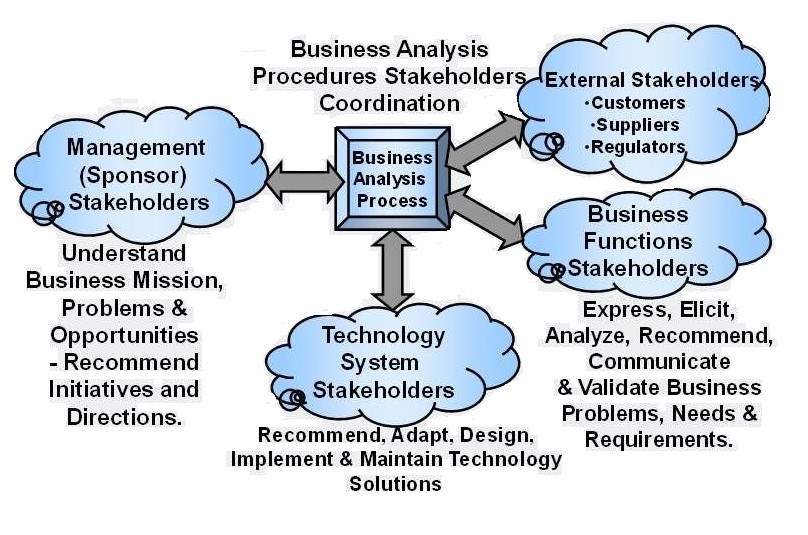
As shown in figure, business analysis process is divided into external stakeholders, business function stakeholder, technology system stakeholder, and management stakeholder. In external stakeholder, there are three stage to complete it which are customers, supplier, and regulator. IoT is used in technology stakeholder for recommend, adapt, design, implement, and maintain of solutions. Management stakeholder understand business mission, opportunities and problems. Business function stakeholder take care of communication, requirements, problems and analyze.
4.2 Finance analysis structure
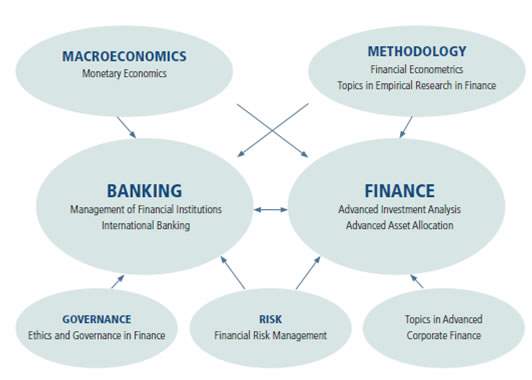
Looking at the diagram, we will notice that the main areas banking and finance are at the center. The flagship banking program is “Financial Institution Management” where students can analyze individual banks and get the latest bank management functions. The main financial course is advanced investment analysis, and students are actively involved in recent financial academic research. In the banking sector, there is also a second “International Banking” course covering international macro banking, such as deposit insurance and financial crisis management. Familiarize students with advanced techniques in portfolio performance and risk management.
4.3 Data management structure
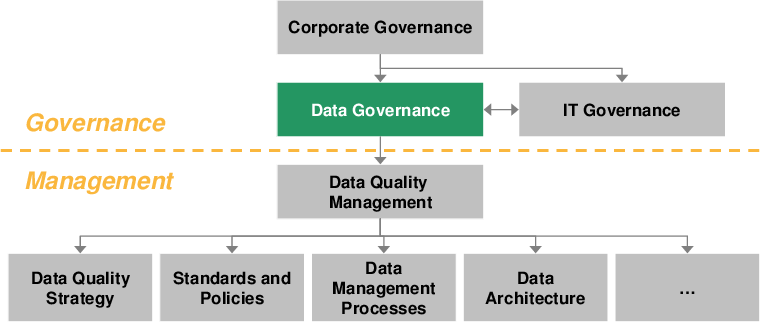
The given structure divided into two parts one is Governance and another is Management. In governance sector, there are three different platform, which are Data governance, IT governance, and corporate governance. However, management sector consists of data quality management, data quality strategy, standards and policies, data management process, and data architecture. Data governance send their data to quality management for verify and proceed data for managing information.
5 conclusion
5.1 Iot in business
We propose a lean design approach to business models that use IT to create new value that plays an important role in business management. The proposed design approach allows for the design of business models by repeating design values in research, evaluation, learning, and stages. We apply the proposed method to the design of the IoT business model for machine after-sales service and evaluate its effectiveness. We propose a lean design approach to business models that use IT to create new value that plays an important role in business management. The proposed design approach allows for the design of business models by repeating design values in research, evaluation, learning, and stages. We apply the proposed method to the design of the IoT business model for machine after-sales service and evaluate its effectiveness.
5.2 Iot in finance
Supply chain finance introduces the concept of supply chain financing model and is studying supply chain risk financing. This not only solves the financing difficulties of SMEs, but also promotes the innovation and development of logistics enterprises and financial institutions. This has improved the competitiveness of the entire industry chain and achieved a win-win situation. But in the country, funding for the supply chain is still in its infancy and is not very mature. With the development of the economy, supply chain finance will provide a huge space for development, bringing new opportunities and challenges to the innovation of financial theory.
5.3 Iot in management
“Enterprise applications are becoming more and more complex.” [14] Therefore, enterprise data management is not only critical to Industry 4.0 applications. We have described a cloud storage center that addresses the issue of integrating different data sources to provide a consistent enterprise database system for client applications. In last, IoT is leading era for various types of management such as data management, hotel management, event management, productions management, business management, and other kind of management is becoming very easy.
REFERENCES
[1] Masahiro Ide, Yukio Amagai, Mikio Aoyama, Yasuhiro Kikushima “Methodology for Business Models and Its Application to IoT “,2015, Washington, DC, USA.
[2] Y. Benazzouz, C. Munilla, O. Gunalp, M. Gallissot and L. Gurgen, “Sharing user IoT devices in the cloud”, 2014 IEEE World Forum on Internet of Things (WF-IoT), 2014.
[3] M. M. Lehman, “Programs, Life Cycles, and Laws of Software Evolution”, Proc. IEEE 68 (9), 1980, pp 1060–1076
[4] OECD Publishing, “OECD Business and Finance”, 2015. Peris.
[5] Business world innovative technologies, Markham, Canada.
[6] Jim Eckenrode. (Executive director of financial services), Deloitte, Boston, US
[7] Angel Au-Yeung, “Forbes”, Insights Team with intel IoT, 24 Aug 2018, Washington, DC, USA.
[8] YUKIO AMAGAI, Qunie COPRATION, “IoT Business Model Development”, Tokyo, Japan, 2015.
[9] D Veit, et al., Business Models, Business & Information Systems Engineering, Springer, Feb. 2014, pp. 45-53.
[10] M. Miller, The internet of Things, QUE, 2015.
[11] D. Veit, et al., Business Models, Business & Information Systems Engineering, Springer, Feb. 2014, pp. 45-53.
[12] Z. Bi, L. D. Xu, and C. Wang, “Internet of Things for Enterprise Systems of Modern Manufacturing”, in IEEE Transactions on Industrial Informatics, vol. 10, no. 2, 2014, pp 1537-1546
[13] S. Klinfeldt, M. Guiney, J. K Miller, M. Barnes, proceeding of IEEE, vol:82, Page(s): 231 – 250, Feb-1994,
[14] J. Krueger, M. Grund, C. Tinnefeid, J. Schaffner, S. Mueller, and A. Zeier, “Enterprise data management in mixed workload environments”, Industrial Engineering and Engineering Management, 2009. IE&EM ’09. 16th International Conference on, Beijing 21-23 Oct. 2009, pp 726-730
Cite This Work
To export a reference to this article please select a referencing stye below:
Related Services
View allDMCA / Removal Request
If you are the original writer of this essay and no longer wish to have your work published on UKEssays.com then please click the following link to email our support team:
Request essay removal


